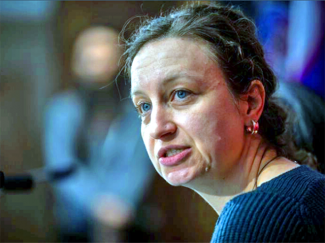LAWYERING UP
Radical lawyers’ collective helps progressives make their case

Irina Ceric
WE CAN’T LET THE LAW FRIGHTEN US OFF. Irina Ceric never has. Nor have any of the other lawyers who work with her in the Movement Defense Committee in Toronto. In fact, the collective lawyers find ways to use the law to give legal support to activists charged with being lawbreakers.
Legal support collectives sprang up when Ceric was in law school in the late 90s. They were a natural and necessary response to the mass arrests at major confrontations between police and demonstrators like the “Battle in Seattle” at the 1999 World Trade Organization summit.
A full blown movement
By the time she graduated grassroots, radical legal support organizing was a full blown movement of its own. “And I became part of that,” says Ceric “both in Toronto and in other cities in Canada, and the US, so I’ve really been doing that work pretty consistently since the late nineties.” But, she wanted more.
She wanted what all good organizers want: she wanted to win today and also build for the future. She decided to make a formal study of radical legal support organizing. She would document and record all the ways legal support worked best. It would be a kind of a manual of best practices for future activists. She made it the subject of a PhD thesis.
Scott Neigh interviewed Ceric for a recent episode of his Talking Radical Radio podcast. What follows are excepts from a transcript of that interview.
History is a tool for organizing
Irina Ciric: “I knew that I wanted [my thesis] to be really based on the experiences and the voices and the thoughts of the people who do this work. ... I knew that I wanted to spend a lot of time combing through the very large volume of materials I had accumulated over the years.
“The big thing that emerged was just how amazingly thoughtful and considerate and sophisticated the practice of radical legal support organizing is.
“But no one had really sat down and said, there is this organized world of radical legal support organizers, and it would really be useful for movements as well as for legal scholars to actually explore that. And that became one of my themes."
As good as lawyers
Irina Ceric: “I guess another big theme that I had was the fact that so much of radical legal support work is done by people who are not lawyers; is done by activists who taught themselves how to understand the legal system often through lived experiences of criminalization or oppression.
“There’s a huge literature on movement lawyering, but there isn’t nearly as much attention paid to activists who do legal work, you know, who organized legal support, who do legal trainings, who work with lawyers.
“There’s some lovely stories from people who were caught up in mass arrests and then sitting on buses with their hands zip tied, standing up and giving the people around them sort of a quick and dirty know your rights training and talking about jail solidarity and saying, ‘Hey, we need to look out for each other when we’re inside.’"
Repression is no exception
Irina Ceric: “It seemed odd to me that the fact that arrests and repression are part of a life cycle of movements didn’t get nearly any attention from social movement or legal scholars.
“One of the things that legal support can do is make it very clear that... criminalization or oppression also happen on an everyday basis, particularly in racialized communities and poor communities.
“The presence of organized radical legal support can transform that moment. And to make, for example, arrests at a demonstration something that actually fuels further organizing.”
Mutual aid and solidarity
Irina Ceric: “At its best radical legal support can point us to understandings of mutual aid and to maybe ways of resolving conflicts that aren’t necessarily coming from the state. That was the most exciting part of this work for me: really seeing the depth of the analysis that we collectively have through this work.
“I love legal collectives and I think we need more of them. But, even when a legal support collective is not possible, I do think that there needs to be structures that can pass on this movement knowledge from one generation of organizers to another.
-
Listen to the whole original interview here
- 30 -













Add new comment